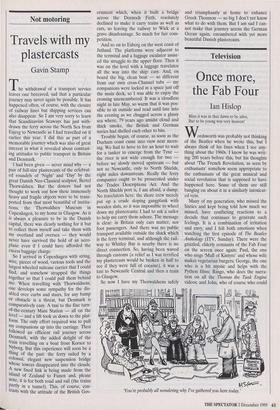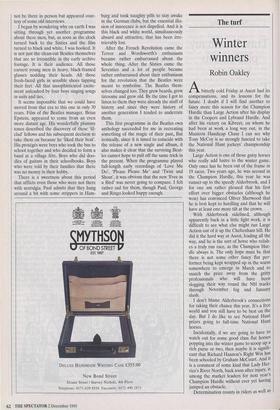Television
Once more, the Fab Four
Ian Hislop
Bliss it was in that dawn to be alive, But to be young was very heaven!
Wordsworth was probably not thinking of the Beatles when he wrote this, but I always think of his lines when I see any- thing about the 1960s. I know he was writ- ing 200 years before this, but his thoughts about 'The French Revolution, as seen by enthusiasts' somehow seem appropriate to the enthusiasts of the great musical and social revolution that is supposed to have happened here. Some of them are still banging on about it in a similarly intoxicat- ed vein.
Many of my generation, who missed the Sixties and kept being told how much we missed, have conflicting reactions to a decade that continues to generate such feelings. It is a combination of irritation and envy, and I felt both emotions when watching the first episode of The Beatles Anthology (ITV, Sunday). There were the grizzled, elderly remnants of the Fab Four on the screen once again: Paul, the one who sings 'Mull of Kintyre' and whose wife makes vegetarian burgers; George, the one who is a bit mystic and helps with the Python films; Ringo, who does the narra- tion on all the Thomas the Tank Engine videos; and John, who of course who could `You're probably all wondering why I've gathered you here today.' not be there in person but appeared cour- tesy of some old interviews.
I began by wondering why on earth I was sitting through yet another programme about these men, hut, as soon as the clock turned back to the Sixties and the film turned to black and white, I was hooked. It is not just the clean-cut Beatles themselves that are so irresistible in the early archive footage. It is their audience. All those earnest young men in heavy, black-framed glasses nodding their heads. All those fresh-faced girls in sensible shoes tapping their feet. All that unsophisticated excite- ment unleashed by four boys singing songs in suits and ties.
It seems impossible that we could have moved from that era to this one in only 30 years. Film of the Beatles manager, Brian Epstein, appeared to come from an even more distant age. His wonderfully plummy tones described the discovery of these 'ill- clad' fellows and his subsequent decision to take them on because he 'liked their beat'. His protégés were boys who took the bus to school together and who decided to form a band at a village fete. Boys who did doo- dles of guitars in their schoolbooks. Boys who were told by their families that there was no money in their hobby.
There is a sweetness about this period that afflicts even those who were not there with nostalgia. Paul admits that they hung around a bit with some strippers in Ham- burg and took naughty pills to stay awake in the German clubs, but the essential illu- sion of innocence is not dispelled. And it is this black and white world, simultaneously absurd and attractive, that has been irre- trievably lost.
After the French Revolution came the Terror and Wordsworth's enthusiasts became rather embarrassed about the whole thing. After the Sixties came the Seventies and a lot of people became rather embarrassed about their enthusiasm for the revolution that the Beatles were meant to symbolise. The Beatles them- selves changed too. They grew beards, grew tiresome and grew old. By the time I got to listen to them they were already the stuff of history and since they were history of another generation I tended to underrate them.
This first programme in the Beatles own anthology succeeded for me in recreating something of the magic of their past, But ironically, since it is timed to coincide with the release of a new single and album, it also makes it clear that the surviving Beat- les cannot hope to pull off the same trick in the present. When the programme played full-length early recordings of 'Love Me Do', 'Please Please Me' and 'Twist and Shout', it was obvious that the new 'Free as a Bird' was never going to compare. I felt rather sad for them, though Paul, George and Ringo looked happy enough.











































































 Previous page
Previous page